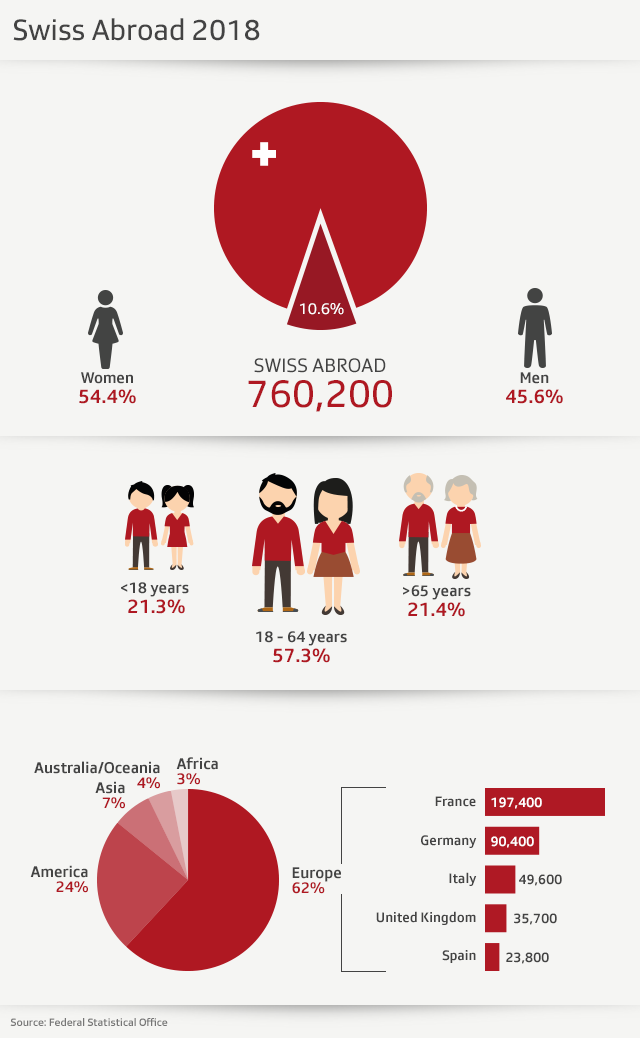
Montreux expat meeting gets a glimpse of the future

This year’s annual Swiss Abroad Congress has heard politicians, scientists and representatives of the business community discussing the challenges of the future. A panel discussion presented the positions of the main political parties ahead of the October parliamentary elections.
The Swiss foreign minister, Ignazio Cassis, referred to a famous 19th century English novel, Alice in Wonderland, in his keynote speech at the two-day congress in the town of Montreux on Saturday.
“If you don’t know where you want to go, then it doesn’t matter which path you take,” as the cat tells the girl Alice in the novel.
But Cassis had no intention of talking about a fantasy world. He outlined his vision for the future of Switzerland’s foreign policy and addressed concerns of many the 760,000 expatriate Swiss citizens around the world.
He notably explained that the data security and the fundamental confidence of Swiss citizens in their direct democratic system were key factors for the government to suspend plans to introduce e-voting on a permanent basis.
But he promised that the government and the cantonal authorities would present possible ways of promoting e-voting by the end of next year.
Over the past few months, the two e-voting providers withdrew their systems due to the discovery of technical flaws, depriving expatriate Swiss citizens in particular of the option of taking part in October’s parliamentary election.
This bleak prospect prompted an outcry among the Swiss Abroad community which can’t always rely on efficient postal services in their countries of residence.

Platform for parties
Representatives from the world of science, business, tourism and culture as well as political interest groups and think tanks also presented their ideas of a future world, with its economic and social challenges, to the about 400 participants meeting in the famous Miles Davis concert hall of Montreux.
It seems doubtful whether the music of the revolutionary jazz trumpet player and composer was able to inspire the politicians present in the lakeside town. They were given a platform to present their party platforms on the hot topics of Swiss politics, ranging from climate change, Switzerland’s relation with the European Union, to social issues.
Inevitably, the issues close to the heart of many expatriates, including the right to a Swiss bank account and e-voting were also on the agenda in one form or another.
Taking a distinctly sober-minded approach, the political scientist Marc Bühlmann from the university of Bern analysed the political achievements of parliament over the past four years for typical expatriate issues.
Parliament and Swiss Abroad
Bühlmann says the concerns of the Swiss Abroad are not a priority of the parliamentarians. He says the newly kindled interest of many politicians in expatriate voters could, to some extent, be described as opportunistic.
The search for a compromise solution in a multi-party parliament is a key asset of the Swiss system, according to Bühlmann. “It takes time and needs patience to find a compromise in democracy,” he said. The reward is a broad political discussion and ideally also additional social legitimacy of the solution.
Bühlmann, who is the director of the Année Politique platformExternal link, says a historical perspective and geographical distance can help put controversial issues in context. Expatriate Swiss citizens could be in a good position to take a sober approach to Swiss politics.
Ahead of the two-day congressExternal link on the shores of Lake Geneva, the Council of the Swiss Abroad held its regular bi-annual meeting.

More
Expat Swiss push for e-vote and EU bilateral ties

In compliance with the JTI standards
More: SWI swissinfo.ch certified by the Journalism Trust Initiative


























You can find an overview of ongoing debates with our journalists here . Please join us!
If you want to start a conversation about a topic raised in this article or want to report factual errors, email us at english@swissinfo.ch.